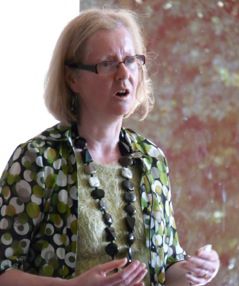From the Shores of Silence
Conversations in Feminist Practical Theology
Edited by Ashley Cocksworth, Rachel Starr and Stephen Burns with Nicola Slee
SCM Press £30.00
(ISBN 9780334060963)
Practical theology has had a slow journey into securing some significance in the academy. There have been landmark books, institutions and academics who have contributed to its growth and agency. Birmingham and Nicola Slee stand out as key elements in the tradition and its development.
These essays have been meticulously commissioned, edited, and interspersed with Slee’s poetry. Four parts (Poetry, Faith and Feminism, Praying Body and Moving Theology) offer a range of essays which invite the reader into considering their horizon of theological thinking and practice. They include young women’s experiences at university, queer priesthood, women presiding in worship. poetic practice as theology, theologies of critical masculinities, Black and decolonial theologies adjacent to feminist convictions, confrontations with sexual violence, rest and rewilding, and a post-menopausal Mary. There is depth, generativity, and unsettling wisdom here for any reader. For those wishing to dig deeper all the essays carefully map their sources and there is comprehensive index. A bibliography might have helped the reader who is less familiar with the field of study.
This book moves feminist theology from a sub section in the library catalogue of choices into the heart of the study of theology – a vital redrawing of the theological map enabling us to understand the richness of the gift of theological voices as they shape both faith and action. It is a reminder that our theology is grounded and formed in our bodies, feelings and experience of insecurity and anger, dislocations, and oppressions. It shows us how we embody the complex network of power and agency in the seen and the hidden. Creative theology calls us to acknowledge power both within ourselves and in relation to others. This is always uncomfortable and disturbing work as we search for words and images to set us free from our illusions and limitations.
I hope that many of these essays will find their way onto reading lists and be broken open by groups and teachers for those who might be longing for a different map.
Inevitably there are gaps. It is not easy to know how a reader might use the book. Collections of essays can be difficult to absorb. The editors might have considered some assistance with reading the map, for example by contextualising how this range of contributions sits within the wider field of practical theology? Some may wonder what effects a global pandemic has had on our theological world. In this respect economics and class are underdeveloped areas especially for those groups who have increasingly limited access to the privileges of the academy. A particular strength is the important (and radical) things the volume addresses to those of us involved in theological formation for public ministry.
Nicola Slee’s practice as a theologian poet stands out, and I hope that we shall be enriched by more of Slee’s poetry in years to come. Perhaps our theological imagination has and always will be enriched by imagination and especially poetry. In this regard chapter two stands out as a way of digging deep into the languages of experience and tradition. A chapter emerging out of a group of poets exploring, questioning, digging, interrogating, and celebrating the truth and wonder of living in the divine gaze, which takes their readers on a pilgrimage of discovery.
This book is a significant landmark in feminist practical theology and deserves to be widely read and used. Gratitude to Nicola for her inspiration, learning and creativity.


